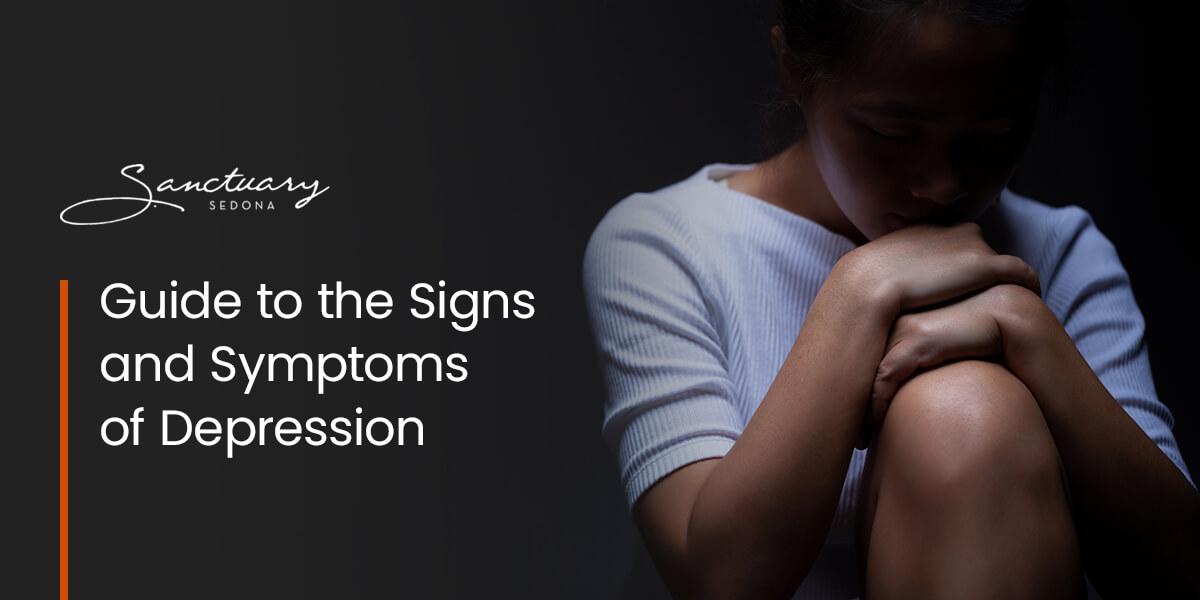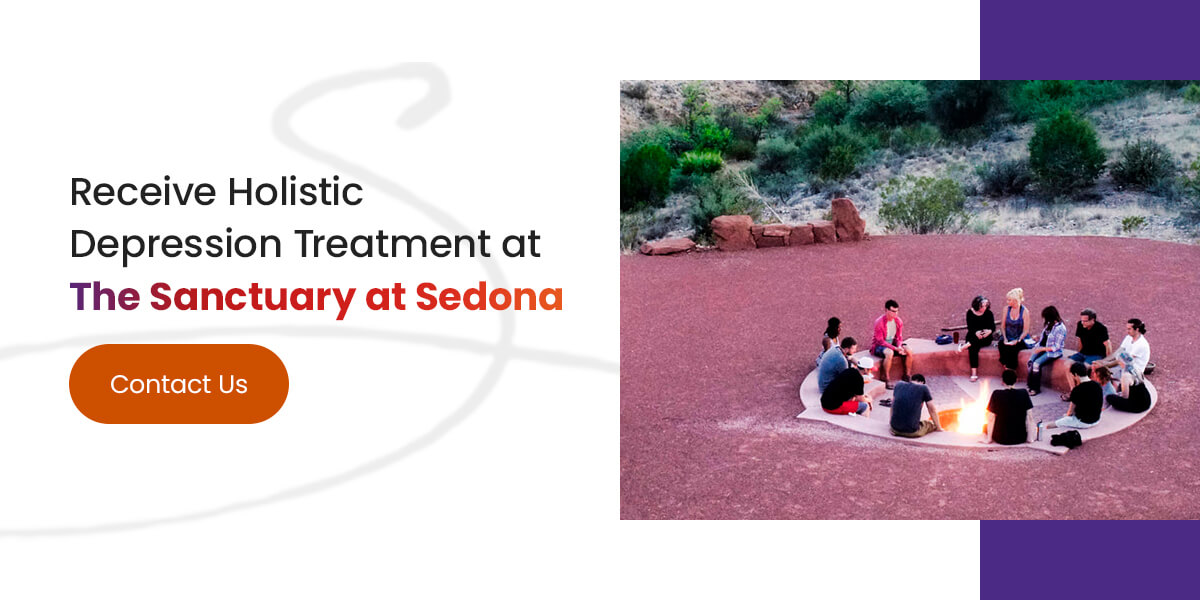Depression is more than feeling sad. It can affect the mind and body in various ways and cause symptoms that interfere with everyday life. If you notice yourself or a loved one experiencing signs and symptoms of depression, there is hope for healing.
Treatment options include natural and medical methods to treat depression symptoms. A holistic approach to depression recovery allows you to heal your mind and body so you can rediscover your passion and purpose in life. The brain has an incredible ability to change, and it is possible to self-regulate your nervous system to reduce depression symptoms or fully recover from depression.
Recognize the Signs and Symptoms of Depression
People often associate depression with sadness. However, depression causes various physical, emotional and cognitive symptoms that can affect an individual’s daily life and ability to carry out regular tasks. You or a loved one may be experiencing depression if you notice any of the following signs and symptoms:
Emotional and Psychosocial Signs and Symptoms of Depression
Some common signs and symptoms of depression include the following:
- Increased or frequent feelings of sadness, anger or irritability
- Feelings of guilt
- Self-criticism or self-hatred
- Recurring thoughts of suicide or death
- Anxiety and panic
- A desire to isolate from others
- Low self-esteem
- Persistent worrying
- Pessimism and feelings of hopelessness
- Loss of interest in previously enjoyed activities
Cognitive Signs and Symptoms of Depression
Depression can affect a person’s ability to carry out daily tasks and maintain regular routines because of how it affects cognition. A person with depression may experience the following cognitive symptoms:
- Difficulty focusing
- Frequently feeling distracted
- Changes in temperament
- Difficulty making decisions
- Impaired problem-solving abilities
- Restlessness
- Impaired memory
- Inability to control negative thought patterns
Physical Signs and Symptoms of Depression
Depression symptoms extend beyond the brain to affect the body as well. It can cause the following physical symptoms:
- Drastic sleep pattern changes such as hypersomnia and insomnia
- Eating habit changes such as a loss of appetite or increased appetite
- Significant weight loss or weight gain
- Major energy boosts followed by significantly decreased energy levels
- Lethargy and fatigue
- Pain such as headaches, cramps, joint pain and stomachaches
- Unexplained digestive complications
- Low sex drive
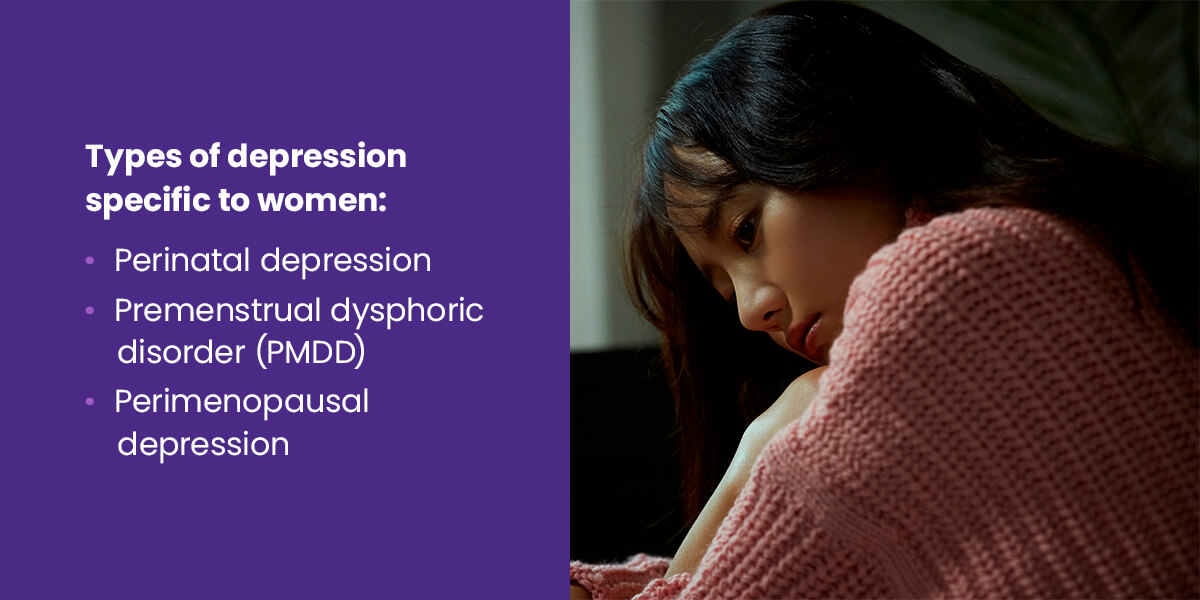
Signs and Symptoms of Depression in Females
Depression is more common in women than men due to social, hormonal and biological factors women experience. Certain types of depression occur exclusively in women. Women may experience depression at different phases and stages in life. The menstrual cycle, perimenopause, pregnancy and the postpartum period cause hormonal and physical changes that can cause the following types of depression specific to women:
- Perinatal depression: Perinatal depression includes both prenatal depression and postpartum depression. Prenatal depression can occur during pregnancy, and postpartum depression can develop after a woman gives birth. These conditions can complicate a woman’s ability to care for herself and her newborn.
- Premenstrual dysphoric disorder (PMDD): PMDD is a more severe form of premenstrual syndrome, and it can cause symptoms such as sadness, irritability, appetite changes, suicidal thoughts, breast tenderness, bloating and muscle and joint pain.
- Perimenopausal depression: Perimenopause is a transitional phase that occurs before menopause. Perimenopausal depression can develop during perimenopause, causing symptoms such as sadness, anxiety, irritability and lost interest in previously enjoyed hobbies and activities.
Signs and Symptoms of Depression in Males
Men can experience the same common depression symptoms as women, but men may experience more anger, irritability and aggression than sadness. If a man’s depression mainly shows up as anger, doctors and loved ones may not recognize the aggression as a symptom of depression.
Men are more likely than women to experience trouble sleeping, and they are more likely to consult their doctor about their physical symptoms than they are to seek treatment for emotional symptoms.
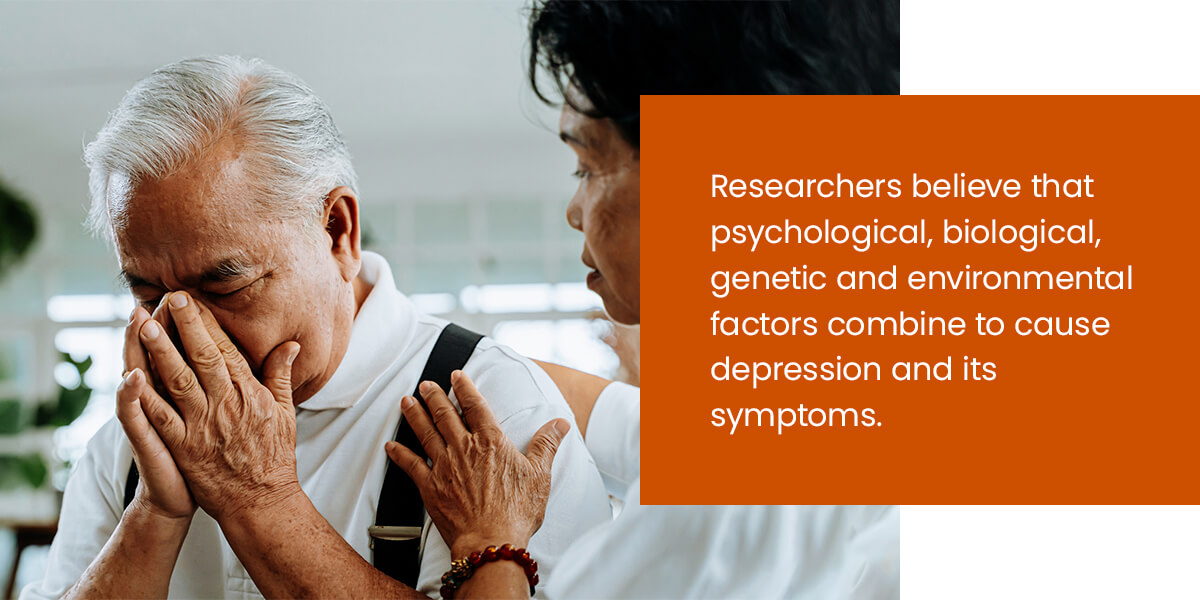
Causes and Risk Factors of Depression
The exact causes of major depressive disorder are unknown because researchers are still studying the condition. However, completed research has found that certain risk factors can contribute to depression and increase an individual’s chances of developing it. Researchers believe that psychological, biological, genetic and environmental factors combine to cause depression and its symptoms.
Depression and Co-Occurring Disorders
Depression often occurs alongside another condition. Depression can occur as a result of another condition, and it can cause other disorders to develop. For example, a person with a chronic illness may develop depression due to the stress they feel managing their illness. Another person may use drugs or alcohol to self-soothe depression symptoms and develop a substance use disorder. Individuals with depression may experience these common co-occurring disorders:
- Post-traumatic stress disorder (PTSD): PTSD is a disorder people can develop after experiencing a frightening, shocking, dangerous or significantly upsetting event. It can cause a person to continue feeling reactions long after a traumatic event ends. Depression commonly occurs alongside PTSD.
- Learning disorders: A learning disorder causes information-processing difficulties. The challenges that learning disorders cause can lead to low self-esteem and depression.
- Anxiety and panic disorders: Anxiety can increase the likelihood of developing depression, and depression can also trigger anxiety.
- Substance use disorders: Depression can increase a person’s chance of developing a substance use disorder because they may use drugs or alcohol to self-medicate their symptoms. Additionally, an individual with a substance use disorder may experience depression as a result of their substance use and its consequences on their life.
- Anger management disorders:Anger is linked with depression. As a common depression symptom, a person with depression may struggle to manage their anger and develop an anger management disorder.
- Serious medical conditions: Conditions such as heart disease, cancer, diabetes and autoimmune diseases can cause feelings of discouragement and sadness. If these feelings linger, a person can develop depression.
- Eating disorders: Eating disorders such as anorexia and bulimia severely disturb eating behaviors and can cause severe health complications. Depression often co-occurs with eating disorders, so treating both conditions is important for recovery.
- Attention-deficit/hyperactivity disorder (ADHD): Researchers identify ADHD as a risk factor for developing depression.
- Co-dependency: Co-dependency is a condition that affects relationships and revolves around feelings of rejection, shame and fear of judgment. It often occurs with depression or chronic depression.
Can You Recover From Depression? What Treatments Are Available?
Recovery from depression is possible. Since each individual is different and experiences depression differently, your best treatment plan will depend on your unique needs. The following treatment methods can help you heal and recover from depression:
Psychotherapy
During psychotherapy, a person experiencing depression talks with a therapist. The therapist may use interpersonal therapy, dialectical behavioral therapy (DBT) or cognitive behavioral therapy (CBT) to help treat your depression. Talk therapy can help you accomplish the following:
- Create goals for your desired changes
- Practice healthy coping techniques
- Recognize negative thought patterns and replace them with positive, realistic thought patterns
- Learn stress-management strategies
- Adjust to and cope with your challenges
- Talk about your experiences and challenges with a compassionate professional
Medication
When combined with other depression treatment methods, medication can help reduce depression symptoms, but it can also worsen depression symptoms in some individuals. The effectiveness of medication for treating depression varies by person. Some people respond very well to medication, while others experience better results without it.
Depression medications can sometimes trigger the chemical imbalance in the brain that causes depression. When an individual takes depression medication, their brain may adjust its regular functions and adapt to the consistent flow of serotonin. You may experience increased depression, suicidal thoughts or withdrawal if you take depression medication or stop taking it too quickly, so consulting with a doctor is important.
A certified psychiatrist can help you determine the best medication options for you and monitor their effectiveness based on how you react to them. The main goal at The Sanctuary at Sedona is to naturally balance your mind, spirit, body and soul without medication. While medication is not our primary treatment method, we can help you implement it within a holistic treatment approach.
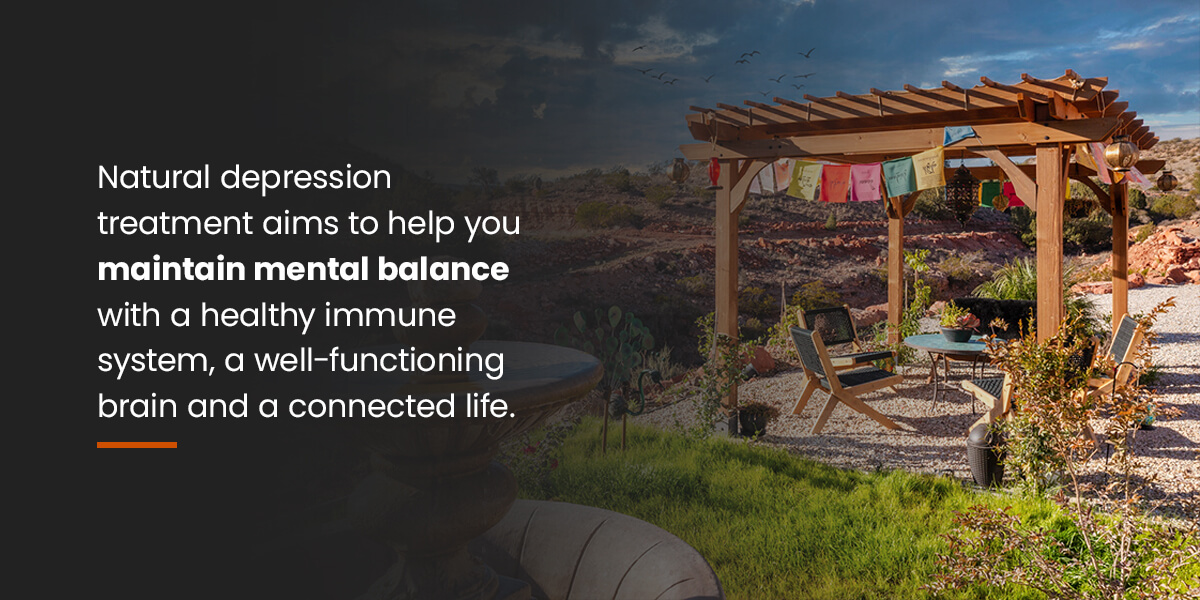
Holistic Therapies
The goal of holistic therapy is to heal your whole self. It combines several treatment methods to address different aspects of depression so it can naturally subside. Holistic therapies focus on the following areas:
- Body: Your body can hold onto depression, so it’s important to release it. Bodywork can help eliminate depression from your cells.
- Brain: Treating the brain can help heal the cognitive and emotional depression symptoms. Practices such as eco-therapy and meditation can calm the brain, and an anti-inflammatory diet combined with natural supplements can keep the brain healthy.
- Soul: Practicing therapeutic creativity, ceremony and ritual can help you heal and reconnect to your soul.
- Spirit: Energy medicine can help you release depression from your energetic field and heal your spirit.
Holistic treatment for major depression is immersive and treats your whole self. The idea that chemical imbalances in the brain are the main cause of depression is a common belief, which is why many people often rely on medication to treat their depression. However, the brain can grow and change without prolonged use of depression medication.
Your brain can grow new neural networks and cells, eliminating depression and helping you heal your thought processes, mind, body, spirit and soul. Natural depression treatment aims to help you maintain mental balance with a healthy immune system, a well-functioning brain and a connected life.
Holistic depression treatment starts with healing and calming your nervous system by treating your symptoms. Once your mind, soul, body and spirit begin to feel better, you can address the root cause of your depression so your brain can find true balance. With holistic treatment, your brain can adapt to new, positive habits, and you can heal your depression rather than simply treat the symptoms.
Frequently Asked Questions
You might have some questions if you or a loved one experiences depression. Learning as much as possible about depression is an excellent first step toward healing or helping a loved one find healing. Some frequently asked questions about depression include the following:
How Can I Treat Depression Naturally?
There are several ways to treat depression naturally. Taking care of physical and mental health can significantly impact depression and its symptoms. The following methods are common natural remedies for mental health disorders:
- Eating a healthy diet
- Exercise
- Yoga
- Meditation
- Talk therapy
- Practicing spirituality
- Nervous system self-regulation techniques
- Lifestyle changes
Not all individuals with depression have to take medication to ease symptoms. You can address the root causes of your depression and learn how to self-regulate your nervous system. You can manage stress through meditation and yoga, and exercising can release endorphins in your brain to evoke feelings of pleasure and happiness.
Talking through your challenges and feelings with a therapist can help you process your thoughts and emotions, and you can learn healthy ways to cope and find your passion again. Practicing spirituality is also an excellent way to treat depression naturally because it can help you connect with your purpose and feel more positive about life.
How Can I Help a Loved One With Depression?
Family members can offer a great support system to individuals with depression. If your loved one is experiencing depression, you can let them know you’re available if they need someone to talk to or sit with them. Practice active listening, ask open questions and express empathy by validating their feelings.
Since depression can make everyday tasks difficult to complete, you can offer to help them with small chores around the house. You can also help them find a treatment center for professional support if they are open to it. The recovery process for depression may seem slow, so be patient with your loved one as they work toward healing.
Is Depression a Chronic Condition?
Depression occurs differently in each individual who experiences it. Some people may experience depression only once when a specific event triggers it, while others may experience it several times throughout their lives. At The Sanctuary at Sedona, we believe that the brain can change and heal from depression to prevent it from recurring.
Receive Holistic Depression Treatment at The Sanctuary at Sedona
Depression can cause various symptoms that make it difficult to live everyday life. It can affect your mood, eating and sleeping habits, relationships, energy levels and physical health. You may experience depression once due to a traumatic event or experience it several times throughout your life. While depression can interfere with life and evoke feelings of hopelessness, there is hope.
A holistic treatment plan can help you treat your symptoms, develop healthy coping strategies and address what is causing your depression. Treating your whole self allows you to change your brain and work toward a life free from depression. With the right treatment plan, you can rediscover your passion and purpose while developing healthy habits that benefit your mind and body. If you or a loved one is experiencing signs and symptoms of depression, you can seek treatment at The Sanctuary at Sedona.
The Sanctuary offers holistic treatment methods that address the mind, body, soul and spirit to help individuals develop healthy coping strategies and recover from depression. We use natural treatment methods to help people calm their nervous systems and resolve the root causes of their depression to find healing.
At The Sanctuary at Sedona, you can nourish your body with organic gourmet food, reside in private luxury accommodations and receive treatment from licensed behavioral health professionals. Contact The Sanctuary to learn more about how we can help you or a loved one recover from depression.

